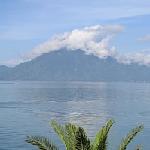
Guatemala Human Rights Commission/USA
.jpg)


.jpg)
For Guatemalan Villagers, Ability to Vote is a Victory
By Manuel Roig-Franzia
Washington Post Foreign Service
Monday, September 10, 2007; A11SAN JUAN DE OBISPO, Guatemala, Sept. 9 -- Marta Aquino carefully folded four sheets of paper -- pink, green, blue and white -- then dropped them into long, clear plastic pouches Sunday in this village at the foot of the majestic Water Volcano.
The marks Aquino placed on her multicolored ballots, which were cast in a village hosting a voting center for the first time, propelled her into a new class of Guatemalans: 1 million first-time registered voters in a country where discriminatory practices often made it difficult for villagers to vote. Even as the echoes of a violent campaign season were still being felt and voters awaited results, election day was unspooling as a kind of triumph for the Marta Aquinos of this country.
"I feel like I'm completing my civic duty," she said, smiling broadly.
Pre-election polls predicted a Nov. 4 runoff for the presidential contest. The leading candidates among 14 are Álvaro Colom, a two-time failed presidential candidate who promised improved education and health care, and Otto Pérez Molina, a retired general who vowed to use troops to combat drug violence and ran under the slogan "mano dura," which translates as "iron fist."
Official results could take several days. At least 50 candidates and activists were killed in the months leading up to the election, which included state and municipal races.
Voting appeared to be proceeding peacefully in most of the country late Sunday. But in the village of Cerinal, southeast of Guatemala City, a mob of 250 burned a voting booth because the mayor was suspected of bringing in Salvadorans to vote for him, police spokesman Carlos Calju said. In San Jose Villa Nueva, another village near Guatemala City, a crowd blocked a mayor from casting a ballot because of suspicions he was trying to vote twice.
Huge challenges await the presidential winner. Nearly 60 percent of Guatemala's 12 million citizens live below the poverty line -- including 75 percent of the indigenous population -- and 6,000 murders per year make the country one of the world's most violent.
The number of Guatemalans registered to vote this year rose more than 20 percent over 2003, pushing the rolls to nearly 6 million people. The huge increase was propelled by a decision, applauded by international observers, to erect voting centers in rural areas rather than effectively disenfranchising those villagers by obliging them to make long trips to register and vote. On Sunday, Guatemalans were able to cast ballots at more than 13,750 centers, nearly 5,000 more than in 2003.
In the months before the election, Mayan villagers could attend classes on the basics of voting: drawing an X on their preferred candidate's symbol, voting for only one candidate per race and not invalidating their ballots by marking outside designated areas. Registration requirements were also streamlined.
"This is a historic opportunity to bring elections closer to people who have been totally forgotten and abandoned by the state," Álvaro Pop, a Guatemala City political analyst, said in an interview Sunday.
Aquino, a 22-year-old health care counselor, said she did not register for the last presidential election in 2003, giving up after numerous attempts to sort out her identification papers. This time, she registered with ease in her home town, a place of sloping, narrow streets in the mountains west of Guatemala City.
A few steps from Aquino, Alma Morales watched each voter file into the auditorium of the Mixed School of San Juan de Obispo and took notes on her election-observer pad. In years past, Morales and her neighbors had been forced to pile into crowded, smoke-belching buses for a two- or three-hour bus ride to Guatemala City to cast their ballots.
In those days, the only way for her to change her voter-registration address was to pay a hefty fee and wait in line for hours. Morales, a 43-year-old nurse, couldn't afford the fee, so she couldn't change her registration. This year, she changed it in minutes.
"You know," Morales said, "things are starting to get better."
Home | Site Map | Contact Us
3321 12th Street NE, Washington, DC 20017
This site is maintained by the Guatemala Human Rights Commission/USA
as a means of informing the general public of the Commission's work
on behalf of the people of Guatemala
